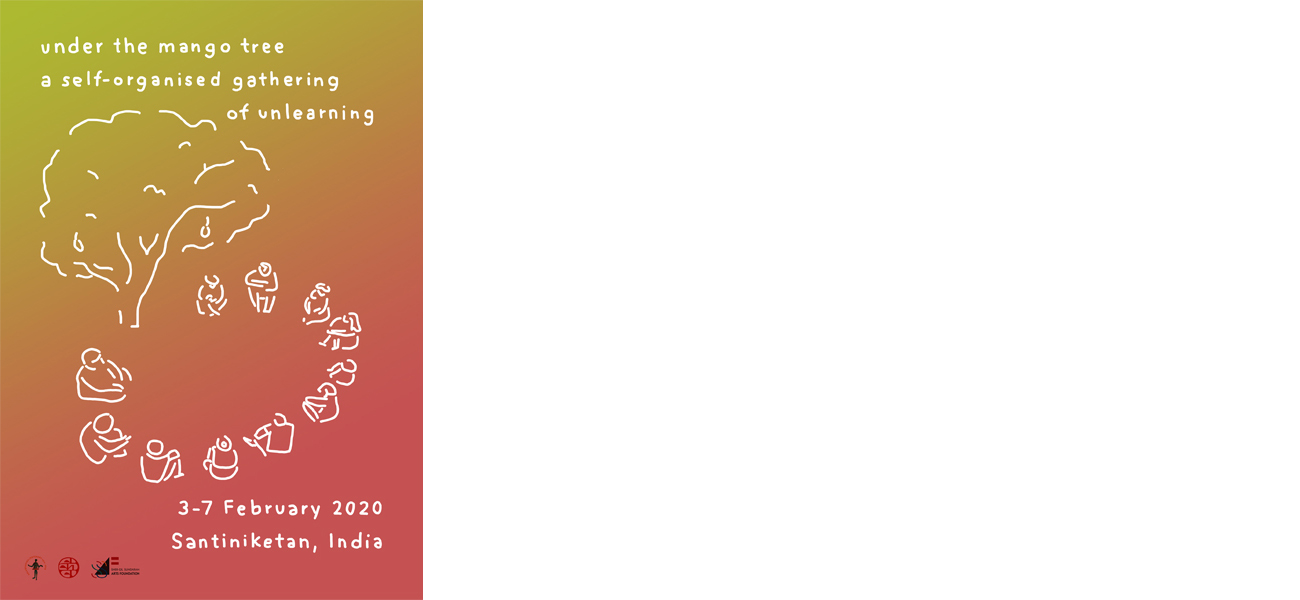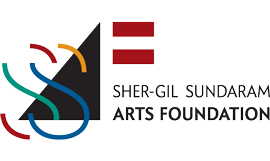A Self-Organized Gathering of Unlearning
Co-curated by Sepake Angiama, Sanchayan Ghosh, Tara Lasrado

2-7 February, 2020 | Kala Bhavana, Visva Bharati, Santiniketan
Under the mango tree is a self-organised gathering of small scale artist-led initiatives, schools and libraries with a focus on practices from indigenous practices and the global south. The first gathering was initiated during Documenta 14 in 2017 and surfaced concerns around pedagogy as practice, centering indigenous knowledge and sustaining alternative practices outside of the model of the western canon. The first edition was coordinated by Sepake Angiama together with the support of Adam Szymczyk, curator of Documenta 14. The second edition under the mango tree coincided with the 100 year celebrations of Kala Bhavana, the art institute under Visva Bharati University in Santiniketan established in 1919. It was co-curated by Sepake Angiama (artistic director, Institute of International Visual Art, London), Sanchayan Ghosh (artist pedagogue and Associate Professor, Kala Bhavana, Visva Bharati, Santiniketan) and Tara Lasrado (independent curator, Zurich) with active support of Department of Painting, Kala Bhavana,Visva Bharati, Center for Interdisciplinary Arts, Kala Bhavana and Sher-Gil Sundaram Arts Foundation, New Delhi, India.
The gathering drew together artist-led initiatives specifically from the region & internationally with a focus on a south to south dialogue, as well as indigenous practices with education and (un)learning at the centre of their practice. This time the focus was on land-based learning, rural & performance practices that address the relationship to the individual and collective body. The gathering kept an open invitation to previous participants of the gathering, but also welcomed new voices that connected with the local and regional practice. under the mango tree, together with the Center for Interdisciplinary Arts, and the Students, Faculty and Community of Kala Bhavana, Visva Bharati, organized a self-organized gathering of unlearning, between 3rd and 7th of February 2020. During the 5 days workshop both open and closed workshops, walks, readings and discussions as well as performances and screenings happened all through the days. While most of the programme took place during this time, two contributors extended their time with the students of the school. Harvest School (Assam) and Escuela de Officios (Puerta Rico) took the opportunity to extend their projects over a period of two weeks as the artistic processes needed a longer period of time to engage with the students.
Santiniketan opens up a context in which to explore an anti-colonial, multiple and inclusive narrative, with a pluralistic view on modernity, and a great location that welcomes humanity to reconnect with the environment. Fifteen contributors from US, Europe and Asia landed in Santiniketan and were hosted by Kala Bhavana for seven days to share their process of working as a workshop model. Presentations and workshops were conducted by: Dharitri Boro/ Visva Bharati (Santniketan,India), Clare Butcher (Zimbabwe), Alberto Cissello/ Cielaroque (Italy), R Siva KumarVisva Bharati(Santiniketan,India), Pulak Dutta (Santiniketan,India), Anshuman Dasgupta/ Visva Bharati (Santniketan,India), Swati Ganguly/ Visva Bharati (Santiniketan,India), Sanchayan Gosh/ Visva Bharati (India), Jorge González/ Escuela de Oficios (Puerto Rico), Carmen José (Spain), Bobby Sayers (United Kingdom), Nicolay Oleynikov/ Free Home University+School of Engaged Art Chto Delat, Dharmendra Prasad (India), Sharmila Samant/ Shiv Nadar University Noida (India), Vincent Tao (Canada), Meenakshi Thirukode/ Instituting Otherwise (India), Rocio Tejada and Taylor Cruz/ Escuela de Artes Plásticas (Puerto Rico), Abijhan Toto/ The Forest Curriculum (India), Priya Jay (United Kingdom).
Each contributor proposed a method of working to be shared in a span over three to four days and students of different departments of Kala Bhavana and other Art Colleges chose and joined accordingly to the different sessions over the course of the week. Almost a hundred students joined in the process in different workshop sessions. There were also invited participants from other disciplines like dance, music and theater who joined in the different workshops making the experience highly interdisciplinary. There were also observer participants from Bangladesh, Poland, Spain, Brazil and Germany and different parts of India.
The five day workshops utilized self-organized processes of unlearning as well as engaging with the present academic situation of art institutes. The contributors reflected upon the founding principles of Santiniketan’s pedagogical model in general and Kala Bhavana practice in particular through presentations and writing and listening sessions. These were accompanied by hands-on workshops on process and making with local materials and traced the indigenous memory to readdress a dialogic relation to history of process, making and collectivism. Specific conversations were generated around power, oppression, practice and its relation to process as well as making and the body. Contributors proposed different tools to engage with the individual and collective memory of the body, coordination and empathy. Indigeneity was addressed beyond the idea of the local, as a connecting bodily engagement of co-existence of a shared ecology of living, learning and sustaining. Engaging with food habits and collective cooking was a daily activity that explored the notion of labour and consumption on a physical level of shared empathy and tolerance. Land and the specifics of the locality emerged as contested sites of coexistence and resurfaced with notions like representation, research and engagement. Different local landscapes around Santiniketan, multiple venues both inside and outside the institutional space were explored including landscapes and private agricultural sites, gardens, open air stages, libraries and conventional studio spaces.
All the contributors explored a participatory model of (un)learning where the frameworks of the workshops continually evolved out of the daily contribution of the participants and curriculums were framed as a dialogic exchange between the individual and the collective. The processes that emerged were ways of listening, working, and learning as an integrated dialogue of space, materiality and co-existence. under the mango tree, Santiniketan, a self- organized gathering was successful in generating an interface within an institutional frameworks where processes of learning emerged as conversive space of critical informality in the daily activity of the art institute Kala Bhavana. Project initiated by Dharitri Boro continues to find new resonances and interested students to continue to maintain a garden that was instigated through the intensive 5 days of workshops. And we felt that students from different departments got the opportunity to get to know each other and engage with a practice of coming together. We hope that under the mango tree gave the students, contributors of Santiniketan to reflect upon and rethink what it means to be with one another, to be with nature and to continue to build a discursive framework around their ongoing practices.


